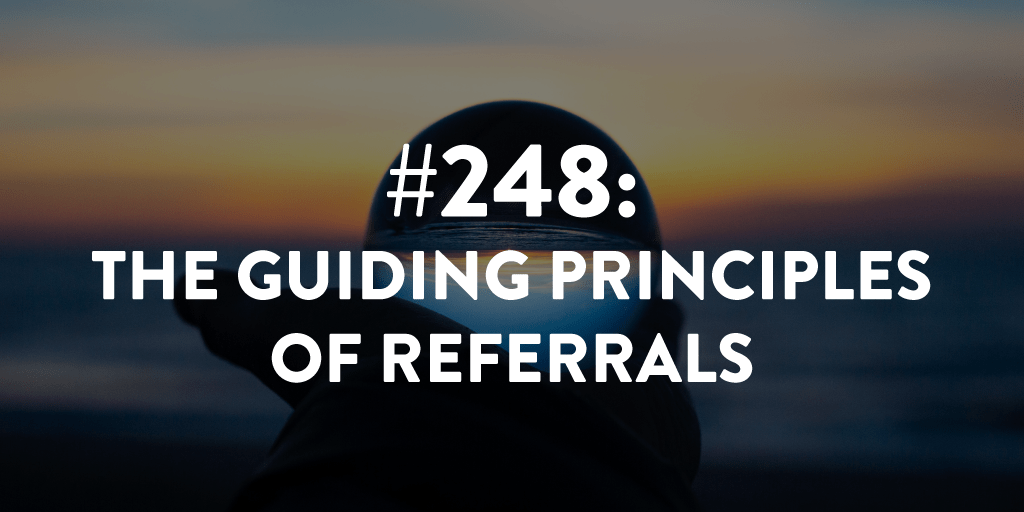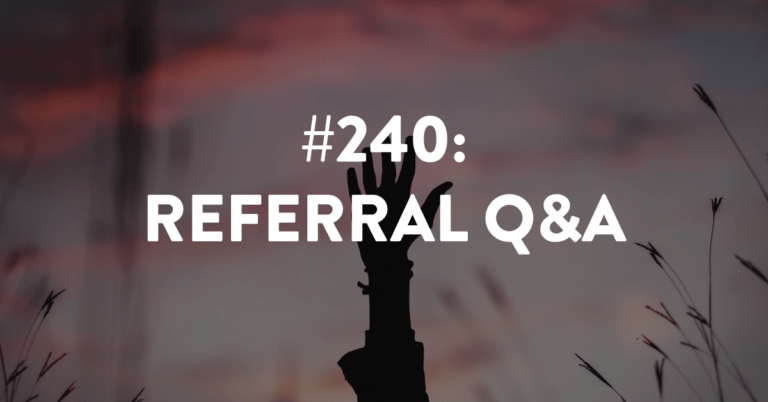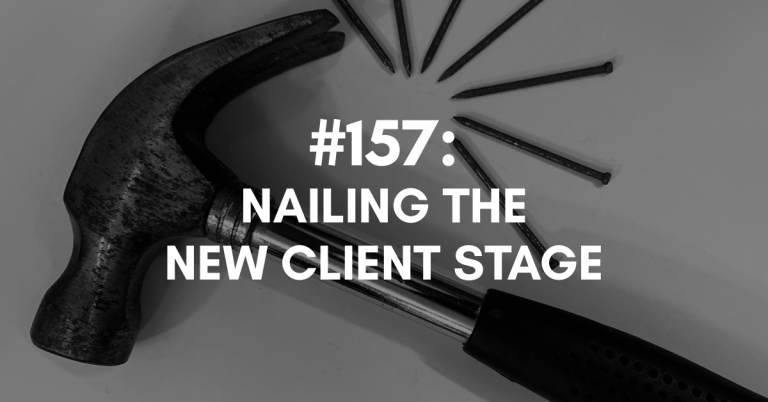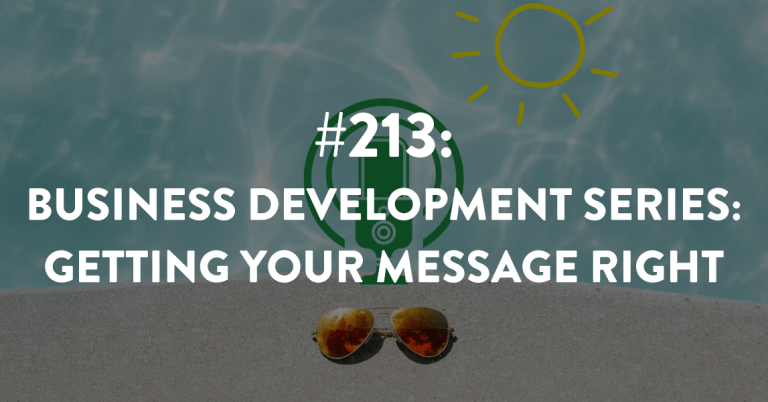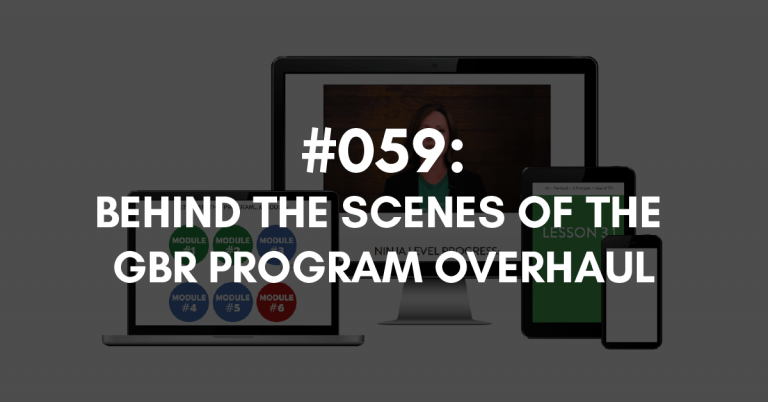Ep #248: The Guiding Principles of Referrals
It’s the age-old question: how do you generate more referrals for your business? It’s no secret that referrals are the easiest way to bring onboard new clients. But why is there so much confusion around the best way to generate them? In this episode, we’ll dive into the importance of referrals as a primary focus for business growth and bringing on new clients.
Listen in as we explore the four guiding principles of referrals that will help you take your referral strategy to the next level. I will explain why building strong relationships with your referral sources should be your focus and how rewarding the right behavior can encourage more referrals.
Links Mentioned During the Episode:
Is it time to get serious about joining Building a Referable Business™ (BRB)? First step is to submit your application BRB to see if you’re a fit.
Next Episode:
Next episode is #249, and the topic is the roots of our relationships.
Download The Full Episode Transcript
Read the Transcript Below:
Stacey Brown Randall: We all want referrals because it’s the easiest way to bring on board a new client. Plus, it makes us feel good when we receive a referral and we’ve been referred. So, then why is there so much misalignment on how you should go about generating those beloved referrals?
Hey there, and welcome to episode 248 of the Roadmap To Referrals Podcast, a show about helping you build a referable business. I’m your host, Stacey Brown Randall.
Referrals should be a primary focus of your business in terms of growth and how you bring on new clients. In case you need any convincing to that, here’s two really important reasons why.
87% of people prefer to make a buying decision based on being referred by someone they trust. And referrals typically have a 70% higher conversion rate. Those are two very compelling math-based statistical reasons as to why referrals should be a primary focus of your business when you’re thinking about how you’re bringing on new clients.
And truly, while I believe that referrals matter for every business, pretty much every single business under the sun, I don’t help everybody under the sun, of course. And truly specifically when I think about referrals, they should matter, particularly if you are in a professional services or the creative industry.
So, think about referrals and what they mean to you. They should be a primary focus of how you go about growing your business. Doesn’t have to be the only focus. I didn’t say only, I said primary. And that’s because, well, I mean, let’s be honest, I teach people how to generate referrals. And so, when I’m helping somebody, I want the method they learn from me to be the biggest piece of the pie in terms of how they bring on their clients.
But I recognize referrals, that piece of the pie that I want to have control over in terms of being as big as possible, probably isn’t going to be the only piece of the pie. But regardless of the industry you are in, referrals matter, I’m assuming for you on some level.
And particularly if you’re in those industries, in those types of businesses that I help with my methodology of generating referrals like professional services and the creative industry, well they matter even more because of our businesses being so much driven on relationship, and there is the heart of how referrals are generated is by those relationships.
So, I’m going to take this episode and dive into the four guiding principles of referrals. These are the four like big ones. There’s lots of things you need to know about referrals and I have been dissecting that information for years now, if you’ve been a longtime listener of this podcast, because we’re about to hit 250 episodes.
Oh my gosh, can you believe it? It’s like every 50 is like a big momentous occasion, but this one just feels bigger because it’s like 250 episodes. It’s crazy. I’ll probably say the same thing about 300 though too, so, anyway.
But I have been talking about this for almost 250 episodes, and guess what? I’m going to keep talking about it. But I want you to listen to this in terms of what this means for your business.
So, if you’re multitasking, if you’re distracted by the person that just cut you off or you’re paying attention to the fact that that grass you’re cutting is not quite yet in the straight line you want it to be in, or you’re just listening to this as you’re walking and you’re paying attention to the crosswalk, take a minute, pause, get through that and then come back to me because I really want you to focus in on.
I really want you to listen to these four important guiding principles of referrals. And I do talk about this stuff. I know I do, whether it’s on the podcast, it’s in the trainings that I do, it’s in the articles I have on my website, it’s in any of the lives that I do like the videos that I do — I know I talk about this stuff.
But I just wanted to group it because I haven’t talked about these specifically together. I just kind wanted to group it together and put this out as an episode for you guys. Something that you can come back to if you’re like, “I feel like I’m getting off track with my referrals.” Let’s come back, let’s re-center ourselves when it comes to why referrals are so important with these four guiding principles.
Number one, the real reason someone refers you. You must know the real reason why someone refers you, and it’s not about you. Now, if you’re a new listener to this podcast, I may have just blown your mind.
You may have just been like, “Wait, did she just say when I get a referral for a new client is actually not about me? What does she mean by that? Like I just got a new client. Of course, it’s about me.” It’s actually not.
The fact that you got a new client because you were referred is like bonus, hello, you’re awesome. That’s great, but it’s not about you. The real reason why somebody is referred to you is because there’s a referral source out there who is talking to somebody who has a problem.
That could be someone they met at a networking event or someone they’ve known for 30 years. That could be their neighbor of next door or that could be a colleague they used to work with. They’re talking to someone, a referral source. Your referral source is talking to someone who has a problem.
And in that moment, the referral source is like, “Wait, I actually know how to solve your problem.” And they get to help somebody else. They get to be the hero and they get to refer that person to you. In this scenario, you are just the solution provider and you’re going to do amazing job. I know you will.
But your referral source didn’t wake up today and say, “Hey, how can I help Andrew grow his business today? Hey, how can I help Megan grow her business today?” Nope, they didn’t wake up and say that.
But when they found themselves in a position to help somebody who needed a problem and how they’re going to help them is by referring that person to you, well, then of course, you get the benefit of a new client.
But this is about your referral source, helping someone they know and feeling good about doing it, and all the science that we talk about. And if you haven’t listened to or watched the training that we talk about, the Referral Ninja Roadmap Training of understanding the science behind referrals, I’m going to link to it in the show notes for this episode.
Because I do think if you haven’t seen that, you should probably go watch that video. It’s like less than 20 minutes. And it walks you through helping you understand the science behind referrals. And it goes deeper at particularly into this point about this isn’t about you. Your referrals aren’t about you. They’re amazing for you and your business, but they’re not about you.
And think about David who is a new Building a Referral Business (BRB) coaching member. David was referred to me. And the moment that my referral source was having a conversation with David, it wasn’t about, “Hey, I’m going to get Stacey a new client today.”
It was about, “Hey, David needs some strategies around generating referrals. Because he’s super good at it, he just needs the processes and procedures around it to make it easier for him to maintain.” And then, my referral source, Tim, thought to refer David to me. In that moment, Tim was helping David. I just got the bonus of a new client and so it helped me as well.
But in the moment that Tim thought about me, it wasn’t because, “Ooh, let’s grow Stacey’s business today.” It was because no, Stacey can be the solution to David’s issue, and Tim gets to help David and Tim gets to be the hero. So, in that moment of that referral happening, it was to help David. I just get to go along for the ride and be a part of the party and of course, I get the benefit of that new client.
So, please remember, when someone refers you, it’s not about you. Which is why all the strategies and tactics and messaging and language and all the things that I teach, processes that I teach, keep the focus on the referral source because that’s who matters in this reality.
And that’s why that’s actually our second guiding principle of referrals, is you need to keep your focus on your referral source. They are the hero. So, keep your focus on them. Treat them like the hero that they are, even though they’re not trying to be the hero to your business, they’re being the hero to somebody else in solving a problem.
Which means you need to keep your focus on the relationship you have with them; which means you shouldn’t go nine months of ignoring them; which means when they reach out to ask you a question but it has nothing to do with referring anyone to you, but they just have a question or need some help, you probably should take some time and get back to them on it.
You should probably have a plan in place of how you’re going to do outreach to that referral source throughout the year so that you’re not doing too much or stalker-ish or doing too little by thinking you could do like one thing a year to maintain that relationship while you’re using the right language, while you’re being memorable and meaningful.
You should have a referral plan of what you’re going to do for all your referral sources throughout the year that focuses on you maintaining the relationship, and them understanding how much they mean to you.
Keep your focus on your referral sources. They are the hero. They’re the hero to the prospect. Let’s be honest, they’re your hero too because they are referring people to you. And what you need to do in that situation to keep your focus on them is to do your part, your responsibility to maintain that relationship.
I’m a business owner like all of you. I get up every day and I have emails I have to answer and I have tasks I have to complete. And a lot of times it has nothing to do with what I actually enjoy which is working with my clients.
It’s like, “Hey, it’s time to reconcile the bank statements.” It’s like, “Oh, it’s time to upload all your documents so the CPA can do your taxes.” “Oh, guess what? We’re actually updating this part of some software and we need you to do some work to it.”
Like I think about like all the things I do that are not like my happy place when it comes to business. I do them because I’m a business owner, I’m a big girl and I know how to do the things I need to do. Like I don’t know who decides to become a business owner and then doesn’t actually like understand that it’s going to be a lot of stuff you don’t want to do, and you still got to push through and do the things.
I got to build out a calendar, I got to pay bills, I got to send invoices. All the things that we all do in addition to the fact of doing what we really love, which is typically I would hope, helping your clients. We all got to do those things.
But you got to make space for keeping your focus on your referral sources, the hero, your hero, and the relationship you have with them. And that should be a strategy, that should be a plan that you build out every year for the entire year so you know what you’re doing so you can make it part of your task list or your workflow or your calendar reminders, whatever it is that you use.
And that process of that referral plan happening to maintain that relationship, it better be doing the right things: memorable and meaningful. Keeping you top of mind and planting referral seeds, and it better feel to the referral source like they matter to you when you do that.
Okay, so those are our first two guiding principles. Recognizing and understanding the real reason someone refers you, it’s not about you. And number two, keeping your focus on your referral source, maintaining that relationship because they are the hero. Alright, let’s talk about the other two guiding principles of referrals.
Hey, pardon the interruption, but I think it’s time you check out our coaching program, Building a Referable Business (BRB). Yep, I know I talk about it all the time. But I would love the opportunity to work with you one-on-one and in a group setting to help you generate all the referrals you deserve this year.
I really do hope for you 2023 is referral-filled. And if you need some help with that, well I’m here and I can help you in our coaching program, Building a Referable Business. First step is for you to submit an application.
So, go to staceybrownrandall.com/referable to learn about everything you can receive inside BRB, like access to me on a weekly ongoing basis, access to all of our 18 referral strategies plus the ones we’re cooking up this year.
And of course, customized roadmaps to follow in 90-day increments, so you stay on track. Again, the link to check out BRB to see if it’s right for you and to submit your application to see if you’ll be accepted is staceybrownrandall.com/referable. What are you waiting for?
Okay, guiding principle number three: reward the right behavior. Now let me tell you exactly what I mean by that. Rewarding the right behavior with our referral sources is not because who they referred to you became a client. So, you’re so happy. And you’re all about, “Oh yay, let me reward that behavior because they became a client.”
It is rewarding the behavior with our referral sources of the act of referring us regardless of that client. Regardless of that prospect becomes a client or not. Outcome is not on your referral source, it’s on you. Now, there’s a lot of people who get mixed signals and they get it kind of, oh, jumbled it up in their heads when I talk about rewarding the right behavior.
I’m actually not talking about, “Hey, you referred me, so now I need to send you a gift card.” No, no, no, no, no. Actually what I teach is that if someone refers you what you need to do, if you do nothing else, even though, gosh, I would hope you would do more. But if you did nothing else at a minimum, I guess I would want you to send that handwritten thank you note.
But I never want you to feel like you’ve got to compensate for that and throw in like that $5 gift card. Or to feel like you’ve got to send in some gift basket to say thank you for referring that client to you or that prospect to you that may or may not become a client.
When I say reward the right behavior, I mean recognize the fact that they referred someone to you regardless if that person can become a client or not. Now, if you see patterns of referral sources that are sending you people that you just can’t close. You see these consistent patterns where people are referring you, but they’re never the right quality or the ideal type of client you can work with …
Obviously, there are strategies that we teach inside BRB about the quality issue and how you have a conversation with your referral source about that. But that’s not something for you to ever pay attention to until you recognize there’s a pattern of them sending you folks that you constantly have to refer out or send to other people or have to say no to.
So, yes, if the quality isn’t there, there is definitely a way that you can manage that and improve that. But what I’m talking about in its fundamental nature, is this idea of you recognizing what your referral source just did and making sure that regardless, if that person becomes a client or not, you are thanking them for it.
And that’s what I mean when I say reward the right behavior. I don’t mean write that thank you note and throw in a gift card. And I definitely don’t mean well, I’m going to wait and see if this person becomes a client and then I’ll thank them for referring them to me. Nope, nope, nope, nope, nope.
The minute you receive a referral, before you even know if this person’s going to become a client or not, you should be taking a few moments to write a handwritten thank you note. Yes, it is that important. And yes, you are totally capable of doing it because you’re running a whole business so you are certainly capable of knowing how to write a thank you note.
And no, it’s actually not beneath you to write a thank you note to the person who just referred you no matter how busy you are. Recognize what they did, don’t let it go unnoticed. Now, do I want you to do more than just a handwritten thank you note? Yes, we teach in BRB a whole follow-up process of the other things you can do after the thank you note when you’ve received a referral for your referral source.
Alright. And in addition to that, how you should continue to maintain that relationship year after year after year by creating an actual referral plan of outreach or touchpoints. So, there’s a lot that goes into that, but just please recognize that when someone refers someone to you, it is not more valuable and worthy of your time because they become a client.
It is valuable and worthy of your time because they referred someone to you before you even know if they’re going to become a client or not. And that is what it means when I say reward the right behavior as one of our guiding principles.
Alright, let’s look at our fourth guiding principle of referrals. This one actually is about you. The other ones haven’t been. So, what is our fourth guiding principle? Guess what? I believe if you do great work, you really do deserve referrals, but you are not owed them, my friend. And you’ve probably heard me say this before.
And if you haven’t, well get ready, you’re going to probably start hearing me say it more if you stay in my world and listen to this podcast or watch my training videos, or join me for any of the live stuff I do. You absolutely deserve referrals.
If you take great care of your clients, if you do good work, if you provide value, if you are the guiding expert that they’re looking for — you are that expert, you are that resource and you do good work, that doesn’t mean everything always goes your way and there are no hiccups and there are no problems that you have to overcome or things you have to apologize for.
But if you do great work, if you are valuable to your clients, then you definitely deserve referrals. And don’t ever let anyone teach you or tell you differently. But just because you deserve them, oh my friend, it does not mean you are owed them. So, you have to be willing to do the work.
You have to be willing to invest in those relationships with your referral sources. You need to be willing to put in the processes and the strategies in place in your business to make sure you are not only deserving of those referrals, but earning them too by how you take care of the people who refer to you or the people you want to refer to you.
There is a right way and a wrong way to do all of that. You just got to know what they are. And then you got to put them into place in your business and then you got to execute every year. Sometimes people wonder if they’re worth referrals.
If you do great work, you are, even if you have mistakes, you probably still are worth referrals. Now, you can’t do crappy work and you can’t have a choppy client experience, and you can’t like provide zero value and then think you deserve referrals.
I kind of think you guys know what I mean when I say, “Hey, if you do great work and you do what your clients need and you provide the value that you promise you will provide, and you overcome the hiccups that are inevitable in all businesses, and if you own them and correct them, at the end of the day, that does mean yes, you do deserve referrals, but you are not owed them.
So, you need to be willing to do some work. And I know you are 100% capable. So, figure out what the work is for you and go do it. If you want some help from me on that, well, then I would love to have you join my coaching program BRB (Building a Referral Business).
Okay, next week is episode 249, and the topic is the roots of our referral relationships. Until then, you know what to do: take control of your referrals and build a referral business. Bye for now.

